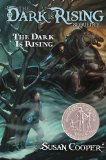
 The Dark Is Rising
The Dark Is RisingReview posted March 5, 2013.
Simon Pulse, New York. First published in 1973. 244 pages.
1974 Newbery Honor Book
2012 Margaret A. Edwards Award
Starred Review
I decided to reread Susan Cooper's books when I heard she'd won the 2012 Margaret A. Edwards Award. I missed her books when I was a kid; I'm not sure why. They would have fit nicely with the other fantasy books that were my favorites: C. S. Lewis, J. R. R. Tolkien, Edward Eager, Zilpha Keatley Snyder. But I have read them once, as an adult. Also in the meantime, The Dark Is Rising was named one of the Top 100 Children's Novels in School Library Journal's poll.
I have to admit, The Dark Is Rising isn't my favorite kind of fantasy, at least not as an adult. I like the main character to have some clear goals and some plans for attaining them. In The Dark Is Rising, Will Stanton does have to find the Six Signs, but to do that, he has to follow his gut. He has to trust to luck and his newly discovered magic and do his best.
However, The Dark Is Rising is a wonderfully atmospheric book. The Dark Rider isn't as sinister as Tolkien's dark riders, but he's close. (And, come on, this is a children's book!) In her Margaret Edwards speech, Susan Cooper described how she was living in America, far from her home. She answered that longing for her home by putting it in The Dark Is Rising. You can feel it. The places described feel real.
And Will moves by feel. You see that throughout the book. So though I personally don't prefer a book where the character just senses what should come next, Susan Cooper was able to pull it off by giving us the feelings along with Will. In fact, as I thought about rereading this book, I admit I remembered most vividly how frightening the beginning of the book is, where the cold tries to get in, and the snow breaks Will's attic room skylight. Here's the scene after he cleans that up:
There was nothing to see, now, except a dark damp patch on the carpet where the heap of snow had been. But he felt colder than the cold air had made him, and the sick, empty feeling of fear still lay in his chest. If there had been nothing wrong beyond being frightened of the dark, he would not for the world have gone down to take refuge in Paul's room. But as things were, he knew he could not stay alone in the room where he belonged. For when they were clearing up that heap of fallen snow, he had seen something that Paul had not. It was impossible, in a howling snowstorm, for anything living to have made that soft unmistakable thud against the glass that he had heard just before the skylight fell. But buried in the heap of snow, he had found the fresh black wing feather of a rook.
He heard the farmer's voice again: This night will be bad. And tomorrow will be beyond imagining.
She's definitely got the atmosphere going. She also works in so many things that seem mythic. Elements of wood, bronze, iron, water, fire, and stone. Herne the Hunter. Even the time of Midwinter through Twelfth Night. And she moves her characters back and forth through time smoothly, which is an accomplishment in itself.
In some ways, it's appropriate for Will to follow his nose in this book. On his eleventh birthday, he discovers as the seventh son of the seventh son, he's one of the Old Ones. He has a task, but has to learn quickly. Part of that learning is to learn to feel his own magic. I don't remember the remaining books well enough to remember if this progresses to where he is more of the instigator. I am looking forward to noticing that this time around.
